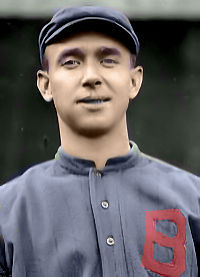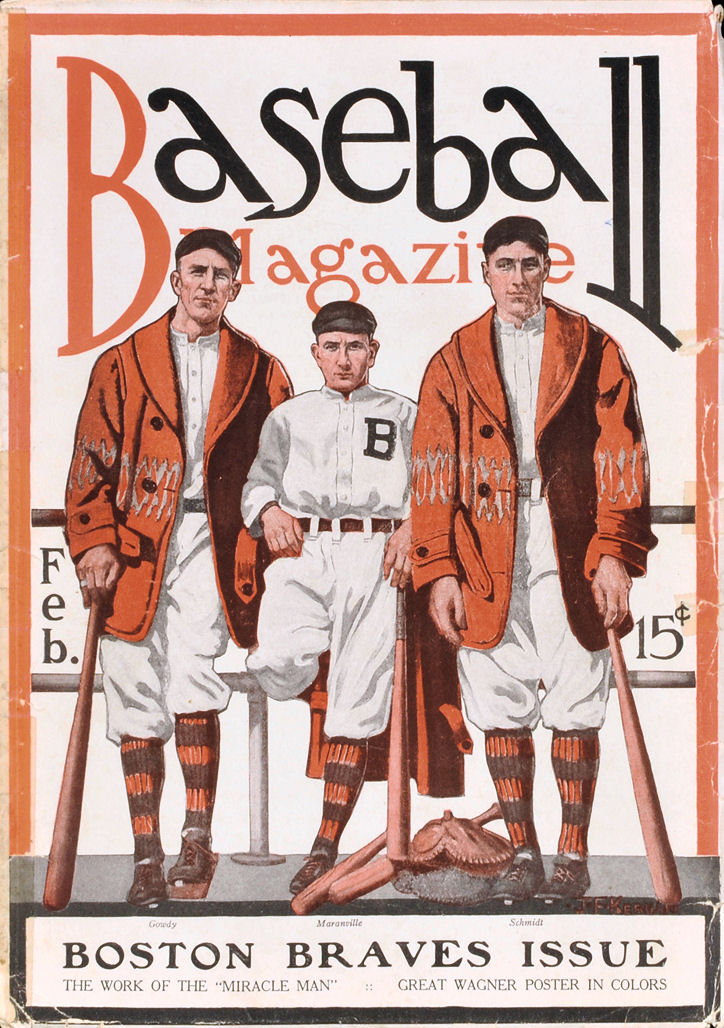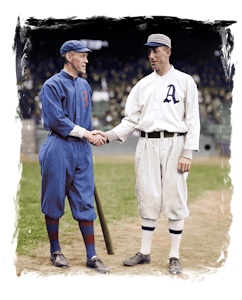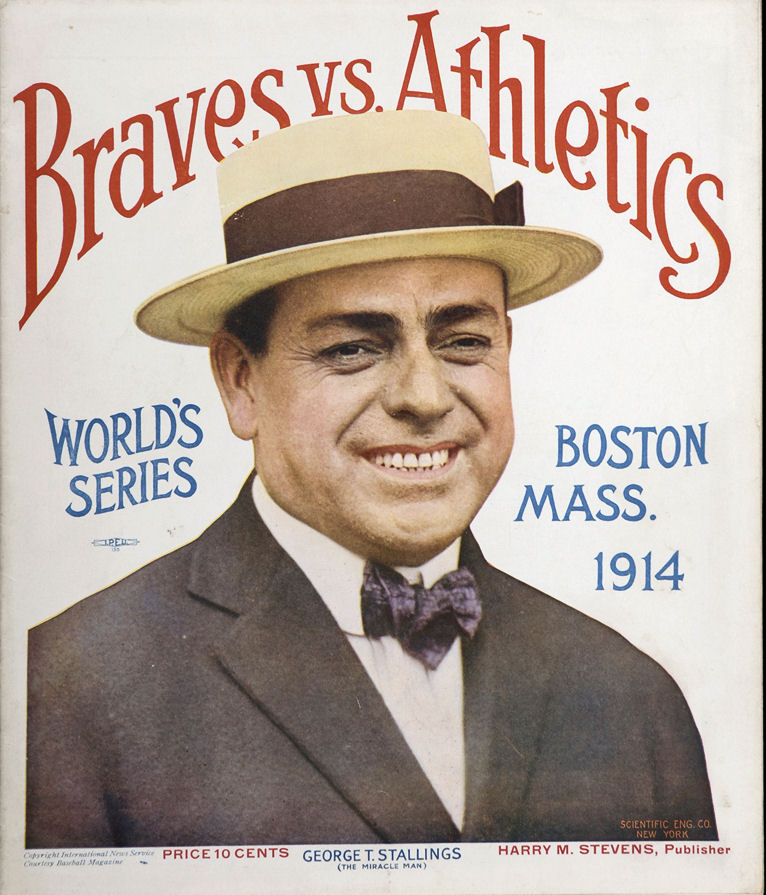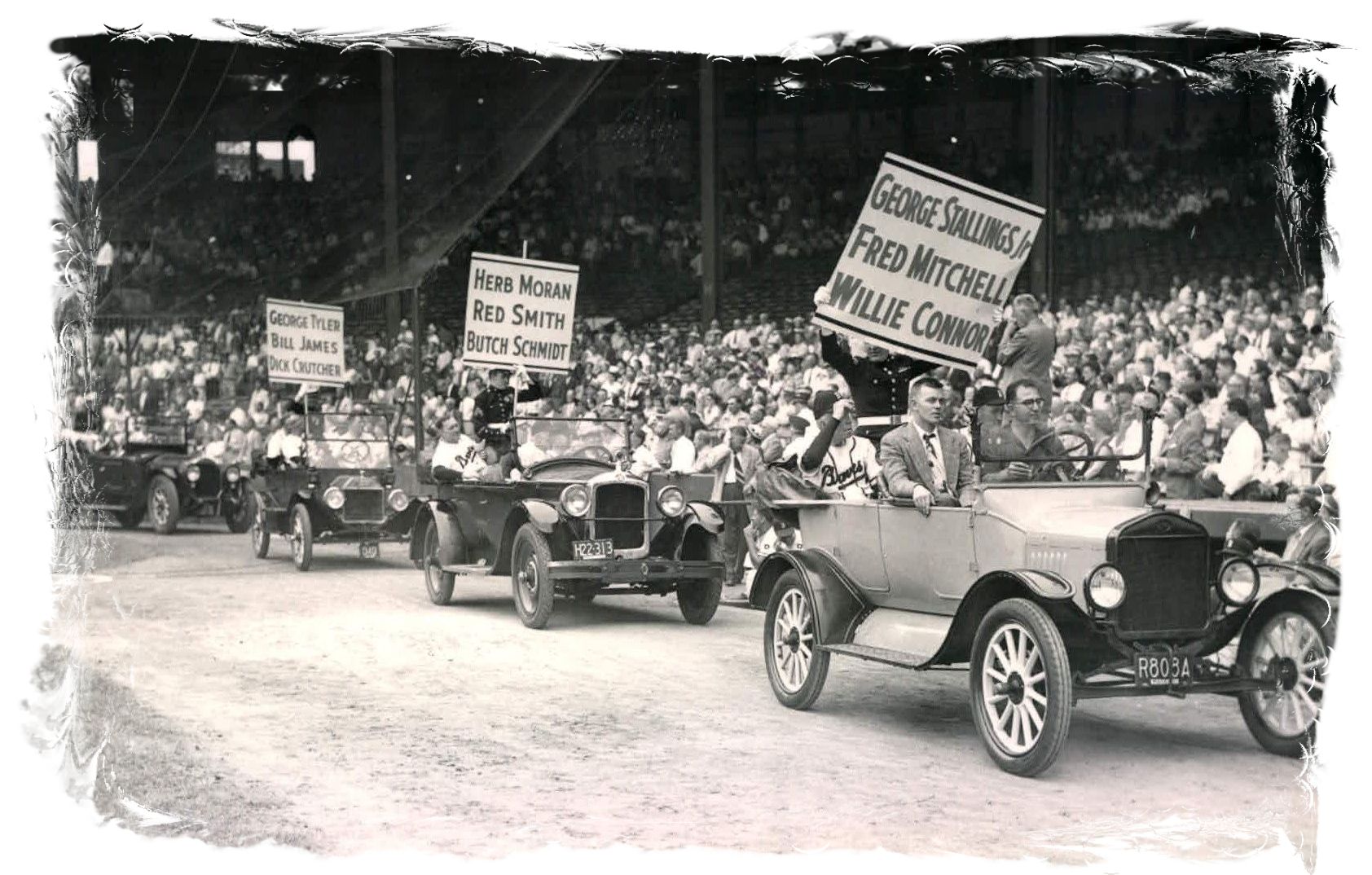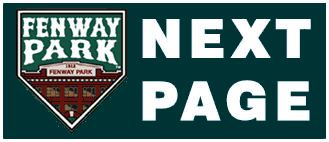|
THE 1914 "MIRACLE" BOSTON BRAVES
Charles W. Murphy, owner of the Chicago Cubs, was the man who made possible the 1914 miracle of the Boston Braves. He fired his manager Frank Chance and made his star second baseman, Johnny Evers, the new player/manager of the Cubs in 1913. The Cubs finished third and Evers, he felt, was a great ball player but too impulsive to ever be a good manager, so he illegally hired a new manager, therefore violating Evers five-year contract, and making him a free agent.
Manager George Stallings and owner James Gaffney made Johnny Evers their one newsworthy acquisition. Evers signed with the Braves on February 12th. Evers used the rival Federal League as leverage and was able to forge a $20,000 signing bonus with incentives, something that would have been unthinkable before the advent of the Federal League. The long-time second baseman was not a superstar slugger who could carry a team offensively, but his experience playing for and managing a consistently successful unit like the Cubs would engender him into a critical leadership role in Boston. Evers was 140 pounds fighting fury. Off the field, he was quiet and reserved, but intensely serious. This was not the Evers that umpires, ballplayers, and fans feared, respected and admired. On the field he was a wildcat, snarling at umpires and clawing at opponents. Manager, George Stallings immediately made him team captain. No team in the league had better leadership than the 1914 Braves with Stallings and Evers. The double-play combination for the Braves thus became Rabbit Maranville to Evers to Butch Schmidt. It was a good combination. Schmidt was a powerful man, and effective, if not a graceful first baseman, but not a long ball hitter. Each year Schmidt returned to Baltimore to work at the family business. Working 16-hour days at the meat market added bulk to his frame, so when spring training arrived, his challenge was to shed some weight, reduce the flab that had gathered over the winter, and get lighter on his feet. It was never an easy chore. The Braves would also open the season with Charlie Deal at third base, who they picked up in the Rule 5 draft from the Providence Greys, where he batted .312. He was a good third baseman, but a light hitter.
Stallings was trying to prove two theories with the 1914 Braves pitching staff. One was that everything else being equal, it was better to use left-handed hitters against right-handed pitchers and vice versa. He therefore employed two sets of outfielders, none of whom were the strong point of the team. The only outfielder who played regularly against both types of pitching, was Joe Connolly, a left-handed batter. In center field, Stallings alternated Possum Whitted, a right-handed batter, with Larry Gilbert, a left-handed batter. In right field, he used right-hander Les Mann with Herb Moran and Josh Devore, both left-handers. The other outfielder was Ted Cather, a pitcher for his first three years in organized baseball. Brought up by the St. Louis Cardinals he was shifted permanently to the outfield. Gilbert was also a former pitcher but had a more potent bat than an arm. The Braves drafted him after he hit .283 for Milwaukee in 1913. The mildest character on the 1914 Braves was catcher, Hank Gowdy, who was the complete opposite of the fiery Johnny Evers. His fiercest words consisted of "Holy Cow" or "Shucks". He had spent most of 1913 in Buffalo, where he batted .313 before being recalled by the Braves. He was the favorite target for Evers because of his good nature. Behind Gowdy was young Bert Whaling, who was bought from Seattle in the following 1912 along with pitcher Bill James. Manager George Stallings did not expect to win the pennant when the Braves reported to their training camp in Macon, Georgia. He did expect to be in the race and he did expect to be in the first division. He told his players that the only thing they needed to worry about was the New York Giants who had won three successive National League pennants.
The Braves made a dismal start. Lefty Tyler was beaten in the season's opener at Brooklyn, on April 14th, by a score of 8-to-2. The Braves lost their first three games before beating the Phillies in Philadelphia on April 21st. While three of the Braves four runs were directly due to errors, the Braves outhit the Phils by 12 to 10. Hank Gowdy was 3-for-3 in the game. The Braves came up with the deciding run in the top of the ninth inning when Gowdy opened by slamming a vicious drive to right field off the wall and eventually scored the deciding run, 4-to-3. On April 23rd, the Braves had their home opener at South End Grounds. There were the usual opening day ceremonies, the band concert, the parade of the players, the raising of Old Glory in center field, and the opening of the game by Mayor Fitzgerald, who threw out the first ball. Just before the game started manager George Stallings received a cluster diamond pin and a gold buckle belt on behalf of his players, from Captain Johnny Evers. Evers was cheered when he first came to bat as was Rabbit Maranville. The Braves won the game, beating Brooklyn, 9 to 1. In the fourth inning, down 1-to-0, the Braves began their offensive work. When Charlie Deal struck a fine single to right field, the Braves led 4-to-1 lead and later added five more. The Braves lost 2 of 3 games to the Robins and then lost two straight to the Giants. They finished the month of April with a 2-7 record, already in 7th place, 6 1/2 games out.
May started with a series against the Phillies and they split two games. On May 4th, the Braves staged a wonderful uphill fight, beating Philadelphia, 10 to 7. Nobody would have given a nickel on the chances of winning after the first inning when the Phillies jumped out to a 5 to 0 lead. The Braves chipped away and were down 7 to 6 going into the sixth inning. With one out Evers singled and Maranville followed with another base hit. With the two runners at second and third. Butch Schmidt came through with a double to left field, giving the Braves the lead. But that was all the excitement the team could muster. They took to the road and lost three games to the Giants and four straight to the Cincinnati Reds. They had won only three of their first nineteen games. Johnny Evers became sick, Rabbit Maranville had tonsillitis, and some of the pitchers had sore arms. In Pittsburgh, they lost 2 of the 3 games they played. George Stallings moaned and complained but the team never gave up. He raved and raged like a maniac pacing up and down the bench, yelling and fining his players recklessly. He kept saying that when everyone came back healthy they would be hard to beat. They had no rules except the one to show up at the ballpark ready to play, and to keep within the law. He would get angry and fine a player $500 for missing a hit-and-run signal and if the player should flare back at him, he'd raise the fine to $1000. However, he never collected a dollar that he had imposed. The Braves lost games but they never lost the spirit of winning. Stallings and Evers worked together, one of them abusing the players in the dugout and the other giving it to them on the field. It was a hard team to play for, but after a period of time, they had the spirit to win. On May 18th, Bill James was on the mound and pitched well. Whenever the Pirates got going and landed a man on base, he tightened up and shut off every prospect of the rally. He gave up only one run. Down a run, James thought he would get things going himself in the eighth when he beat out a little bunt roller, and then went to second on Evers' base hit. Rabbit advanced both runners, but was out at first. Joe Connolly came to the plate and scored both his teammates on a timely single to right, giving the Braves a 2-to-1 lead, that they increased with two more runs, 4-to-1. The Braves then took 3 of 4 against the Cubs in Chicago. Johnny Evers, who was the former manager of the Cubs, played a big part in their defeat on May 21st, by a score of 3 to 1. He paved the way for the first run when he waited for a base on balls in the first inning, and later crossed the plate on Rabbit Maranville's three-bagger. In the fifth, his long sacrifice fly sent Hank Gowdy across with the third Braves run. The Braves got three hits, on May 22nd, but good pitching by Otto Hess and misplays by the Cubs enabled them to shut out the West Siders by a score of 2-to-0. Hess held the Cubs to four hits. The Braves had just three hits, but in the seventh inning, after Jim Murray hit one to the centerfield fence for three bases, Cubs pitcher, Hippo Vaughn let loose with a wild pitch and Murray scampered home. Hess then scored another run after Roger Bresnahan made a wild throw. Unlike the Cubs, great defense was the key for the Braves. Maranville and Evers handled a total of 17 chances between them without missing a beat. On May 24th, the Braves got six hits to beat the Cubs by a score of 3-to-2, winning the series at the West Side Grounds. Down 2-to-0, Butch Schmidt singled to start the Braves fifth inning and went to second on a ground ball out. Hank Gowdy connected, sending Schmidt home with the first run. Then Les Mann lined a hit to center, sending home Gowdy with the tying run. Mann went to third on the throw home and scored what proved to be the winning run on a sacrifice fly by Bill James. The Braves then took another two of the three games they played against the Cardinals in St. Louis. In the first game on May 25th, the Braves played a great defensive game. Whenever serious trouble threatened, the defense tightened up and they managed to defeat the Cardinals by a score of 3-to-2. It was the Braves fifth win in eight games. Three little infield hits, which nobody could handle, a line drive single by Hank Gowdy, a base on balls to Johnny Evers, and a home run by Rabbit Maranville with the bases loaded, gave the Braves six runs in the second inning, on the way to a 7-to-4 win against the Cardinals on May 27th. After allowing the Phillies to come from behind and beat them out in the morning game by a score 8-to-7 in 11 innings, the Braves managed to get an even break in the Memorial Day twin bill in Philadelphia on May 30th, by taking the afternoon contest in 10 innings by a 3-to-2 score. Johnny Evers doubled home the winning run in the 10th. Gene Cocreham came in during the seventh inning and managed to hold the Phillies in check for the rest of the game.
But then it was business as usual for the Braves, when they lost four of five games in Brooklyn winning only the first game of a June 2nd doubleheader. It took them 13 innings to win that game. The Braves started the game quickly and chalked up two runs. After that outburst, both pitchers settled down to business and there was not a sign of a run until the fifth inning and then the Robins tied up the game. Very suddenly in the 13th inning, the Braves scored what would be the winning run when Les Mann sent the ball whistling down the third-base line and made it to third when the ball finally got back to the infield. Bill James took a hand in winning the game and sent a little tapper down to third that couldn't be handled and they won 3-to-2. The Braves had started the road trip in last place and finished it winning only eight of the 17 games, sinking further into the basement with an 11-26 record, 12 1/2 games behind. They started on the right path when they came home and opened up with a 7-to-2 win over Cincinnati on June 5th. Evers and Maranville were the hitting stars, with Evers getting a single and two doubles, while Maranville got two singles with men on base. After losing the two middle games of the series, the Braves broke even by winning the final game, 3-to-2 on June 9th. Butch Schmidt got two of the five hits that the Braves made in his three times at bat. It was the first of five straight wins, as they next swept the Pittsburgh Pirates in four hard-fought games. On June 10th, the Braves smashed the Pirates, 11-to-2. Rabbit Maranville came through with three singles, a double and a sacrifice fly in his five trips to the plate. The Braves repeated their assault on Pittsburgh by winning the second game of the series by a score of 3-to-2 on June 11th. This one was not a one-sided affair, but a close, hard-fought contest from start to finish. The Braves opened on in the first inning when Johnny Evers singled, Joe Connolly doubled and the Rabbit Maranville brought both home with a single to center, and a quick lead. The work of the two great shortstops, Honus Wagner and Rabbit was important in the game. In their third game, on June 12th, the Braves won another good game from the Pirates by a score of 5-to-3. Joe Connolly and Larry Gilbert put the game away with home runs after the Pirates had tied the score in the first half of the seventh inning. And finally, the Braves came from behind in a tense thriller on June 13th and won the final game of the series 4-to-3. The two teams alternated in the lead or being behind several times, and at no time was there no more than a one-run edge. The Braves held the lead when the Pirates knocked in a run to tie the game in the eighth inning. But back again came the Braves in their half after two were out. Singles by Les Mann and Hank Gowdy, accompanied by a double steal, gave them what proved to be the winning run on a steal of home. The Cubs came to the South End Grounds next and the Braves took three of the four games. On June 16th, the Braves took the second game of the series by a score of 7-to-5. In the sixth inning, the Braves led 6-to-5. Then in the eighth, Hank Gowdy drew a pass and Larry Gilbert beat out an infield hit. Johnny Evers worked a pass to fill the bases and Joe Connolly came up to the plate. He watched and waited until he was walked to force Gowdy over the plate with the walk-off game-winner.
The Braves next swept a doubleheader on June 17th, by scores of 8-to-3 in the morning and 7-to-3 in the afternoon. Lefty Tyler and Bill James were the pitchers. Both pitchers did great. Charlie Deal provided the big hits in the first game and Les Mann came through with a bases-loaded triple in game number two. And James shut out the Cubs for six innings in the afternoon. Then the Cardinals and Braves split their series, but the Braves won, coming from behind against the Cardinals on June 19th. In the eighth-inning, the Cardinals were in the lead, 5-to-3. Maranville was the first up and sliced out a double to right. Butch Schmidt singled and sent home the Rabbit. Charlie Deal came up next and hit a slow ball back to the pitcher who tried to force out Schmidt at second, but he was ruled safe. Les Mann laid down a perfect bunt that put Schmidt on third and Deal on second for Bert Whaling, who came up and singled to center to score both runners, putting the Braves in the lead once again. After a walk, Hank Gowdy was hit by a pitch, to force in Whaling from third, giving the Braves a two-run lead, 7-to-5. In the third game of the series on June 20th, the Braves won by a 3-to-2 score in a pitcher's battle. Bill James held the visitors to three singles for the entire game. St. Louis won the finale to gain a split. Against the first-place Giants on June 24th, the Braves split a doubleheader. The Braves won the first game 7-to-3 and the Giants won the second game 4-to-0. In the first game, the Braves then took the lead in the third inning when Maranville singled to score Gilbert with the go-ahead run. The Braves tacked on three more runs in the fifth inning. With one out, Joe Connolly smashed one over the right-field fence. Then Maranville drew a walk, Gowdy singled and Charlie Deal brought them home with a triple to right. The Braves had won 12 of 16 games and on June 25th, the team climbed out of the cellar into seventh place by defeating the Giants with a walk-off 7-to-6 win when Paul Strand doubled home Bert Whaling in the ninth inning for the walk-off. After winning 14 of 22 games, the next day they were back down in the basement when they lost to the Giants. Outfielders Possum Whitted and Ted Cather were then traded from the St. Louis Cardinals to the Braves for pitcher, Hub Perdue. On June 28th, Archduke Franz Ferdinand of Austria, heir to the throne, visited Sarajevo, the capital of the nearby provinces of Bosnia and Herzegovina. Six assassins took up positions along his motorcade and fired at him and his wife, killing them. They hoped his death would free Bosnia from Austrian rule. A doubleheader was split with the visiting Phillies on the last day of the month on June 30th. The Braves won the second game 4-2 and Rabbit had five hits in eight times up.
On July 3rd the Braves traded Jack Martin for outfielder, Josh Devore. The Braves next lost three of the four games with the Phillies and three straight to Brooklyn before winning a doubleheader on July 6th. The first was won by a score of 3-to-1 and the second 1-to-0. Dick Rudolph and Dick Crutcher were the pitchers and it was only through luck that Brooklyn was able to score their only run. Johnny Evers, meanwhile was 4-for-7 in the two games. But the Braves had lost 8 of their last 12 games and were 15 games out of first place, deep in last place. Adding insult to incompetence, they then traveled to Buffalo to play an exhibition against the Buffalo Bisons, who honored Manager George Stallings once leading them to a pennant, in the International League and were embarrassed, 10-2, on July 7th. Stallings fumed as they boarded the train. “Big league ballplayers, you call yourselves, eh? You’re not even Grade A sand-lotters. I’m ashamed of you all.” Using the loss against the minor leaguers as a rallying point, Johnny Evers challenged his team to start believing in themselves. The Braves met his challenge. “We did something nobody ever believed possible,” Rabbit Maranville said decades later. “Gamblers were laying 100-1 against us on Opening Day with hardly any takers. They raised the odds to 1,000-1 after the first month. By July 4th, after we had been in the cellar all but three days, you could have gotten 1,000,000-1.” But from that abysmal day in Buffalo laid the foundation for one of baseball’s unlikeliest and greatest rises from oblivion. Their luck gradually changed. After the trades made for Whitted, Cather and Devore, the team played more consistently. The pitching staff settled down, once Stallings decided to use Rudolph, Tyler, and James as his primary three starters. He also added more strength to the bench by purchasing Red Smith from Brooklyn. The team went on the road to Chicago and things started to happen. On July 8th, the Braves were forced to go 11 innings before they beat the Cubs. In the 11th inning, with the score tied at four each, Jim Murray was given a base on balls and Bert Whaling sacrificed him to second. Lefty Tyler's out sent Murray to third and Ted Cather singled him in. Cather then made it to third base on Oscar Dugey's hit and Joe Connolly was walked. Maranville next sent both runners across to make the score 7 to 4. Tyler got the Cubs out in the 11th for the victory. The next day, July 9th, the Braves trimmed Chicago by a score of 3 to 1. Bill James held the Cubs to six widely scattered hits, and with the exception of two innings, not a Chicago base-runner got past second base. Mixing their hits with four errors made by the Cubs, the Braves beat the Cubs by a 5-to-2 score in the final meeting of the series at the West Side Grounds on June 11th. Evers, Connolly and Schmidt got two hits apiece and Rudolph was a stumbling block for the Cubs giving up only six hits for a total of 14 bases. The Braves won their next two games in St. Louis. The first was a runaway, 12-5, on July 12th. Josh Devore and Bert Whaling led with three hits each. The next day, July 13th, the Braves had to go 12 innings to win a game. Cardinals outfielder, Cozy Dolan was nice enough to give the game to the Tribe when he let Oscar Dugey's line drive go between his feet for a home run in the 12th inning, 8-to-7. But the Cardinals won the last two games of the series to gain a split. In Cincinnati, on July 17th, In a brilliant pitching duel, the Braves won out by a close 1-to-0 score. Bill James allowed just four hits and was never in trouble. The next day, July 18th, the Braves won by a score of 6-to-3. Dick Rudolph held the Reds to three hits and one run in the first six innings. The Braves left the cellar for good on July 19th, when they swept the series in Cincinnati. The Braves were down two runs when the ninth inning started in the final game against the Reds. But the Reds' defense broke down and allowed the Braves to come from behind and smash out a 3-to-2 victory. As they left the field the players threw their caps and bats into the air and cheered like college boys, but they were still 10 1/2 games back. It was then that their big three pitchers stepped up and save them. Tyler, Rudolph and James gave up an average of about one run per game over a stretch of the next 15 games. After they left Cincinnati, they posted four shutouts against the Pirates in Pittsburgh over the following five games. On July 20th, the excellent work of Lefty Tyler gave him a win by a score of 1-to-0. The Braves moved into sixth place with the defeat of the Dodgers at St. Louis. Next, Dick Rudolph shut out the Pirates, 6 to 0, on July 21st. Rabbit Maranville got two hits and was running all over the infield with nothing getting past him. The Braves and Pirates split a doubleheader on July 22nd. The Pirates gave them an opening in the first game and they took advantage of it and romped home by a score of 1 to 0 in 11 innings as Bill James worked his second shutout. The Pirates bumbled the game away in extra innings. Charlie Deal was first up in the 11th inning and Honus Wagner made a mess of his little roller. He was sacrificed to second and Hank Gowdy hit safely into left field. Max Carey let it get away from him, and Charlie came across with the only run. The Braves left Pittsburgh with another shutout, 2 to 0 on July 23rd. Lefty Tyler again, was in the same excellent form that he showed in the opening game of the series. The runs secured by the Braves were the result of some shady support given by the Pirates infield.
When the Braves left for
Boston they had gone 12-4
on the trip, now in fourth
place, 11 games behind the
Giants.
The Braves finished Chicago off when they belted the Cubs on July 29th, 8-to-3. Possum Whitted, who took Johnny Evers place at second base, had a wonderful game, both in the field and at bat. He handled some nasty grounders and knocked out a triple, a single and a sacrifice in his four trips to the plate. The Braves had taken 11 of 15 games from the Cubs this season. Next, it was the third-place Cardinals, who came to Boston five games ahead of the fourth-place Braves. The Braves were held to one hit in nine innings, on July 30th, but errors, allowed the Braves to win 2-to-1. Lefty Tyler pitched well, and the one run made by the Cardinals was on a freak home run in which the ball broke through the wire net above the left-field fence and just dropped on the wrong side. After selling Babe Ruth, there was another round of selloffs by, the Baltimore Orioles owner Jack Dunn. On July 29th he sold another one of his best pitchers, Ensign Cottrell, and his 13-7 record, to join the Braves. Dick Rudolph did a masterful exhibition of pitching at the South End Grounds on July 31st. From the opening of the game, until he brought in to a close by striking out the last batter, Rudolph had St. Louis totally fooled, 2 to 0. Les Mann, Rabbit Maranville and Butch Schmidt were the only ones to do damage. Mann got two singles and a double, the Rabbit got two singles and Schmidt knocked out a triple, while Rudolph might as easily had a hit on an error. The Braves hit the ball very hard but many were right at the St. Louis outfielders who had 10 putouts between them. On July 31st, Austria declared war on Serbia and Russia ordered a general mobilization in support. Germany then ordered Russia to stop and Russia refused. The two countries were then at war as a result.
It was on August 1st that the Braves got permission from Red Sox president, Joe Lannin to start using Fenway Park for the very first time. Over 20,000 fans jammed the ballpark to see the Braves win a game from the Cardinals in a 10-inning 4-to-3 walk-off win. With two outs, Johnny Evers came up and doubled to left. Possum Whitted smacked a hot grounder into right field. Evers never stopped as he rounded third, and came home with the walk-off winning run. As a result of the win, the Braves reached the .500 mark for the first time and now were only eight games out of first place. The Braves made a perfect clean sweep of the series with the Cardinals by winning the fourth straight game by a score of 1 to 0 at the South End Grounds on August 3rd. Lefty Tyler spun another great game with his third shutout in his last four starts. He kept the Cardinals' hits at three, and then to emphasize his great work, Lefty led off the ninth inning with a line-drive single and scored the winning run. St. Louis left town with their lead over the Braves cut to two games. On August 3rd, German troops exchanged fire with the French as they advanced through Belgium to attack Russia. Declaring war on France by the Germans, the English were drawn into the war because of "The Treaty of London" with Belgium, which guaranteed assistance if attacked. Now it was the Pirates to try again against the Braves. On August 4th, Dick Rudolph threw another shutout, also like Lefty Tyler, the third for him in his last four starts, winning 1 to 0 on another two-hit game for him. Bill James threw the third consecutive shutout for the Braves on August 5th, blanking the Pirates 4 to 0. Only four hits were made off him and one of those was a scratch infield poke by Honus Wagner. Just one of the Pittsburgh players got as far as second base. In one of the most exciting games played all year, on August 6th, the Braves broke a major league record by winning 23 of their last 28 games. The record was broken when Rabbit Maranville hit a 10th-inning walk-off home run to beat the Pirates. The streak ended the next day when the Braves finally lost after winning nine games in a row. At Fenway Park on August 8th, the Braves beat Cincinnati, by a score of 4-to-3 in 10 innings. In the ninth, Joe Connolly drew a free pass and Rabbit beat out an infield grounder. Butch Schmidt slapped a base hit into right field, and after the ball took a bad hop, Connolly and Maranville scored and Schmidt found his way to second. Bill James, pinch-hitting, came through by cracking out a single to center, knocking in the tying run. Josh Devore opened up the 10th inning with a single, Possum Whitted sacrificed him over and went to third on a ground out. The Rabbit then shot a bullet by the pitcher into centerfield, allowing Devore to jog home with the winning run. On August 10th, against the Reds, the Braves climbed into second place, only 6 1/2 games behind the league-leading, Giants. With Bill James on the mound, the Reds did not have much of the show. Only six hits were made off him and three of those, which included a double, were Texas Leaguers. The Braves finished the homestand, having won 11 games and losing just two.
The Braves next acquired
thirdbaseman
Red Smith from
Brooklyn on August 10th. In the second win, on August 14th, the Braves made the Giants look small compared to them and won by a 7-to-3 score. They pounded Jeff Tesreau, who lasted only five innings, during which eight hits and six runs were scored. Bill James was on the mound for the Braves and he allowed six hits in nine innings, with no two of them coming in the same inning. Joe Connolly came through with a double, a single and a home run in his three times at bat. The Braves finished the series with a 10-inning, 2-0 win by Lefty Tyler over Christy Mathewson on August 15th. The fans were there hoping to see Mathewson check the onward rush of the Braves, but they did not see any of these things. But on the contrary, they saw the great master out-pitched by Tyler. Lefty never pitched better and had now pitched a shutout in his last two games. The team left the Polo Grounds now only 3 1/2 games behind the Giants, in second place. In Cincinnati on August 17th, the Braves won both games of a doubleheader 11-to-1 and 7-to-3. Dick Rudolph won the first game and Bill James won his ninth straight in the nitecap. The team had 30 victories in 36 games. In a 3-to-2 win on August 19th, Lefty Tyler saw the first run scored on him in more than 27 innings, in the fifth inning. The Braves next shifted to Forbes Field in Pittsburgh and took the first game of the series by a score of 6-to-3 on August 20th. Dick Rudolph (17-8) won his 11th consecutive game, without breaking a sweat.
The Braves and the Pirates broke even in the doubleheader played on August 22nd, with Pittsburgh's winning the first game by a close score of 3-to-2 in a 12-inning battle. The Braves came back and won the second game 4-to-2. Manager Stallings did not care to work Lefty Tyler so soon, so he started Otto Hess in game number two. Otto pitched well, with only two bad innings in the fourth and the sixth. The Braves barely missed going into the lead in the National League pennant race, since the Giants were beaten again by Cincinnati. But now, the Braves were just 1/2 game behind. On August 23rd the Braves tied the Giants for first place. The Reds hit Christy Mathewson hard and scored three runs in the first inning, which was enough for them to win. It had taken the Braves just five weeks to climb from the bottom to the top of the National League, winning 34 of the last 42 games they played. From the middle of July thru the middle of August, Lefty Tyler (12-9) pitched four shutouts, giving up only three earned runs in seven games and 63 innings pitched, for a 0.43 ERA. On August 25th, the Braves beat the Cubs, 4-1, after losing the day before. Southpaw Hippo Vaughn put up a good game for the Cubs against Bill James. Fewer hits were made off him, but seven of the eight Braves hits were bunched in the three innings that they scored. There are upwards of 12,000 fans and it was quite apparent that many of them were rooting for the Braves. Those who supported the Braves today, were obvious friends of Johnny Evers, who still has a lot of them in this town, as well as elsewhere. After winning only one of the three games in Chicago, the Braves fell out of first place by 1/2 game and moved on to St. Louis. On August 29th, the Braves won both ends of a doubleheader before the largest crowds that ever to see a ballgame in St. Louis. The crowd was estimated at 30,000. It was a very home team fan base, because those in St. Louis have visions of a pennant winner in their own team, and were out to encourage them to their utmost ability. They probably did not think much of their team's prospects, as they did on Thursday night after the Cardinals had worked the Braves out of second place, by a 3-to-2 score in 10 innings, and stepped in there themselves. But Bill James shut out the Cardinals by 4-to-0 score in the opening game on just four hits. Next, in the second game, the Braves had taken a two run lead, scoring one run in each of the third and fourth innings of the second game, and were able to win that one by a score of 6-to-4, putting over four runs in the eighth inning.
On September 2nd, Rudolph and James won both games in another doubleheader in Philadelphia. The Phillies were beaten to a whisper and never had a chance to stop the Braves express in either game. Connie Mack sent several of the Athletics players over to watch the game, including Chief Bender, Wally Schang, Herb Pennock and Otis Strunk.
The first game was won by a score of 7-to-5. The Braves scored three runs in the second inning and got busy again in the fifth. Possum Whitted led off with a triple and Joe Connolly hit an easy pop-up that ball fell between two fielders, allowing Whitted to score and putting him on first. Connolly came in to score when Butch Schmidt doubled one down the left-field line. The second game was a runaway and practically clinched in the first inning. The Braves piled up five runs and won by a score of 12-to-3. Bill James gave up two earned runs and got three hits himself. In Brooklyn, the Giants lost to the Robins and lost their hold on first place. In less than two months, the Braves went from last place and 15 games out, to first place with a one-game lead over New York. Still in Philadelphia on September 4th, Bill James won his 20th game. Since the first of July, he had won 13 of the 15 games he pitched. In a nerve-wracked contest that went 12 innings, the Braves won by a score of 6-to-5. In the 12th inning, Red Smith led off with a double, Rabbit Maranville sacrificed him to third, and he was brought home on a squeeze play, with Hank Gowdy laying down a perfect bunt. The Braves took the final game on the next day, on September 5th, 7-to-1. Gene Cocreham was given an opportunity to show what he could do, and although he was touched up easily in two innings, he pitched a very good game. The only run scored against him was something of a fluke, but on the other hand, four double plays helped him. The Braves won three games out of the four in Philly, and 16 out of 22 on the road trip. They left Philadelphia in a tie for first place with the Giants going into a crucial series with them back in Boston on Labor Day.
With the entire city of Boston now abuzz when the Braves returned home. It was at Fenway Park that the Braves set what was Boston's all-time one-day attendance record on September 7th. The morning game against the Giants drew 36,000 fans and the afternoon game drew 40,000 fans. The paid attendance for the two games was announced at 74,163. Some 9000 fans also stood on the fringes of the outfield on Duffy's Cliff. The Braves won the first game 5-to-4 behind Dick Rudolph. Down 4-3, the Braves needed two runs to win the game when they came to bat in the ninth. Josh Devore came through by getting a hit with the ball taking a bad bounce past Fred Merkle at first base. Then came Herb Moran who slashed a double into the crowd in right field, putting Devore at third. Johnny Evers smashed the ball into left field that got by George Burns and bounded over his head, rolling into the crowd in left field, scoring both the runners for the walk-off victory. The crowd went crazy and the players had to fight their way off the field. When the crowd could cheer no more, they began throwing their straw hats in all directions and for a few minutes there was simply a cloud of headgear sailing all around. But the Giants got them in the afternoon game when Jeff Tesreau breezed to an easy 10-to-1 win over Lefty Tyler. The deciding game of the series was played the next day, on September 8th before 17,000 fans at Fenway. Bill James pitched a three-hitter to win it 8-to-3. Rube Marquard was driven from the mound after he had been bombed for four innings, during which the Braves had nine hits, with Johnny Evers contributing three of them. After the three-game meeting, the Braves were alone in first place. The Braves next took four out of the five games they played with the Phillies at Fenway. They split a doubleheader on September 9th. After losing the opener, in the second game, George Davis who was also attending Harvard Law School, pitched a no-hitter for the Braves winning 7-to-0. Five Phillies reached first base on walks and two on errors. Davis walked three men with none out in the fifth inning, but then fanned Ed Burns and got Gavvy Cravath to ground into a double play. It was just one of seven career victories for Davis. Running as smoothly as a well-lubricated machine, the Braves cut down the Phillies in the doubleheader the next day, on September 10th at Fenway Park. They thereby gained a full game and rest easy with a lead of 2 1/2 games when the Giants broke even in a doubleheader with Brooklyn. The first game was scoreless going into the bottom half of the eighth-inning. Herb Moran led off with a single and Les Mann who ran for him, scored when Rube Marshall threw Josh Devore's sacrifice bunt against the bleacher fence. He then passed Joe Connolly and Possum Whitted flied out to score Devore. Connolly was knocked in on a single by Butch Schmidt to give the Braves a third run. Dick Rudolph retired the Phillies easily in the ninth to preserve his 3-to-0 shutout and game his 20th win of the season. The second game was won by a score of 7-to-3. The Braves failed to get underway until the sixth inning. Red Smith had played a smooth game at third and produced the winning run. With two men on and two out, he shot the ball against the left bank going up against the wall, and the game was won right there, leading to a four-run inning. The Braves won the final game of the series with the Phillies by a score of 6-to-5 on September 11th. It was a close call because the Braves had a three-run lead that was not only lost, but the Phillies players were allowed to take the lead, not once but twice, so that the Braves came into the ninth inning needing two runs to win, down 5-4. In the ninth, Oscar Dugey beat out an infield hit and went to second on a wild pitch. Possum Whitted beat out a perfect bunt to reach first with a hit putting Dugey on third. Ted Cather hit a sacrifice fly ball and Dugey scored the tying run. The throw to the plate got away and allowed Whitted to scamper over to third. The Rabbit came up and hit a fly ball that allowed Possum to come in with the winning walk-off run. The win put the Braves up by 2 1/2 games over the Giants. After losing the first game to Brooklyn at Fenway, they won the next two. On September 14th, Dick Rudolph pitched the Braves to score a 4-to-3 win over the Robins. A great play at the plate by Rabbit Maranville saved them from tying the score in the eighth inning. An error and a sacrifice put a runner on third base and Rabbit's play was the highlight of the game. Bill James won his 23rd game on September 15th, pitching himself in and out of trouble. James was touched up today for 15 hits for a total of 21 bases, but getting a 7-to-5 win. Down 4-2 in the Braves half of the third, they put the game away. Johnny Evers singled to center and Ted Cather singled to left to put Johnny on third, and he scored on Possum Whitted's single. Butch Schmidt then waited and drew a pass to fill the bases. Then Red Smith was walked, bringing in Ted Cather and leaving the bases still full. Rabbit Maranville lifted a fly ball to center field to score Whitted and Hank Gowdy doubled to left to score Schmidt. Smith was thrown out at the plate but James helped his cause by poking a single to center and Gowdy scored the fifth run of the inning, making the score 7-4. By winning the final game of the series with the Robins, the Braves increased their lead over the Giants to 3 1/2 games. With the Cardinals in town, the Braves took two games and tied one. September 16th was "Johnny Evers Day". It was a great one for Johnny in particular, and the Braves in general. Twelve thousand fans saw the Braves beat St. Louis in a great game by a score of 6 to 3. The game was deadlocked until the eighth inning when the Boston captain led off with a hit. He went over to third on an error and scored the winning run on a sacrifice fly, as the band played "When Johnny Comes Marching Home". Dick Rudolph, despite of a rough first inning, became steady as a rock on September 17th and won his 22nd game, 5-to-1 over St. Louis. Only seven hits were made off him, and four of those came in the first two innings. Red Smith had three of the Braves' nine hits. The Braves then swept three games from the Pirates. On September 19th, the Braves chalked up seven runs in the 6th inning to beat Pittsburgh by a 9-to-3 score. For five innings the Braves got only one hit, but in the 6th, Butch Schmidt sent a line down the third base line. Red Smith and Rabbit Maranville drew walks to load the bases. Then a line drive by Hank Gowdy that went into deep center field cleared the bases. and gave the Braves the lead.
Rudolph won his 23rd game on September 21st, defeating the Pirates by a 6-to-5 score. Joe Connolly came through with a bases-loaded triple in the fourth inning, and the team never looked back. The Braves defeated Pittsburgh again by an 8-to-2 score in the final game of the series on September 22nd. Lefty Tyler (16-13) did the pitching and was very effective. Except for an error, Pittsburgh would have not scored at all. They got only six hits off Tyler and no two of them came in the same inning except the first one. Connolly again got the big base hit. He came to bat with the bases loaded again and slugged the ball way off the bleacher fence. The Giants were shut out by Chicago and at the end of the day the Braves had increased their lead in the National League to five games. Cincinnati next moved into town and the two teams played three doubleheaders. The Braves only lost one of those games. The Reds came in with a record of 18 straight losses and lost the first game of the doubleheader, 3-2 score on September 23rd. Then the Reds turned around and won the second game dramatically in the ninth inning with a rally, winning 3-to-0. In the opener, Bill James notched his 24th win. In the Braves' ninth with one out and the game tied, Red Smith brought inr the winning run with a homer. Red sent the ball on a fly almost to the stands. It looked as if it would hit the top of the fence, but a youngster who wanted to souvenir reached up at the railing and tried to catch the ball. He dropped it back into the playing field and umpire Ernie Quigley saw what happened and motioned for Smith, who was standing on third, to come home and the Braves won the game. On September 24th, Dick Rudolph pitched a complete game 5-0 shutout. The second game was called after eight innings when it became too dark, ending in a 2-2 tie. Herb Moran had a 4-for-4 day at the plate. Then the next day, September 25th, Rudolph threw another complete game shutout against the Reds, winning 2-0, for his 8th straight win and his 25th victory of the season. The Braves scored a run in the second inning and another in the seventh. Butch Schmidt doubled in the second inning and scored on a sharp single by Rabbit Maranville. In the seventh, Les Mann drew a pass and stole second. The catcher threw the ball over Mann's head into centerfield, allowing Rabbit, who singled and stole second, to score. Bill James bounced a grounder and the shortstop made a wild throw to first, allowing Rabbit to score. The second game was a 4-3 win. Cincinnati trailed for the whole game, as the Braves scored three runs in the second inning. Butch Schmidt started with a single and scored on a double to left by Red Smith. He scored on a single by Rabbit, who made it to second on a wild throw. Finally, the home series ended by winning three straight from the Cubs. The Braves, who were in last place on July 17th, swept another doubleheader on September 26th. Four doubleheaders in six days was a lot of baseball. The Braves swept by scores of 6-to-2 and 12-to-2. In the opener, Rabbit Maranville broke up the game with a grand-slam home run in the fourth inning. In the second game, the Braves got seven hits, which included a triple by Possum Whitted and another homer by Red Smith. It was a free-hitting game at Fenway Park, and the Braves won in a sensational finish by a score of 7-to-6 on September 28th. In the third, the Braves took the lead by scoring four runs. Possum Whitted singled in two runs and stole second. A wild throw allowed him to get the third and he scored on a triple by Maranville. Down 7-4 in the ninth, the Cubs stormed back with two runs. With the bases load, a line drive at Red Smith ended the game. The Braves clinched the pennant on September 29th. They had won 25 of their remaining 31 games and were 68-19 after completing their mid-season climb. They won the pennant with a stunning 10 1/2 game lead at season’s end.
While the National League was turned upside down, the Philadelphia Athletics remained at the American League forefront more conventionally. In 1914, they seldom were challenged and won 99 games, claiming their fourth American League pennant in five years with room to spare. A coin was flipped in Philadelphia and it was decided that the first two games of the World Series would be played in Philadelphia. The Athletics had won four American League pennants in five seasons and were huge favorites to win the World Series. Stallings showed nothing, but contempt, for the overrated Athletics when he talked to his team. He said they were not that good and would never even scout them, although his assistants did so secretly. He predicted to his team that they would win four games in a row and sweep and everyone thought he was crazy. The Braves arrived in Philadelphia on October 7th. Stallings had to call Connie Mack to arrange practice times. He picked an argument with him over the use of the field at Shibe Park, wanting it in the afternoon. Mack did not want to give him afternoon practice time, which he wanted for his team, because the games would be played in that time period and it was his ballpark. Stallings fired that he didn't like his attitude and that his team would beat him up four straight games before hanging up the phone. The next day, the Braves found themselves locked out of Shibe Park altogether, so they practiced down the street at the Phillies’ ballpark, Baker Bowl. Stallings told his players to ignore the Athletics' players during the games unless it was to insult them or harass them. Connie Mack tried to play it cozy before Game #1 by letting his prize southpaw, Eddie Plank take batting practice. He then started Chief Bender, who the Braves hammered for a 7-to-1 victory. Dick Rudolph dominated the A's, allowing only five hits and striking out eight. Stallings played it cozy also and kept changing Rudolph's signs during the game because he didn't trust Mack and wanted to keep him from using anything to help in his next meeting with the star pitcher. At the plate, Hank Gowdy led the Braves attack with a single, a double and a triple.
In Game #2 the Braves had to fight for their lives, but they won it, 1-to-0. Two vital plays were made in the ninth inning and both favored the Braves. Both Eddie Plank and Bill James pitched shutout ball for eight innings and the Braves only had managed six hits against Plank, and James had only given up two. With one out, Charlie Deal doubled over Amos Strunk's head in right field. After James struck out, Deal was trapped off second base. Catcher Wally Schang fired the ball to Jack Barry, as Deal broke for third, and slid in safely ahead of Barry's throw. Les Mann then lined the ball over Eddie Collins' head to score Deal with the only run of the game. Then in the last of the ninth with one out, Barry was passed and took second on a wild pitch. Walsh walked bringing up Eddie Murphy, who was so fast he had not grounded into a double play all season. Evers barked at Rabbit to get closer to the bag. Maranville moved over and stood right behind the bag. He was lucky he did because Murphy smashed the ball between the legs of Bill James and he had nothing more to do than scoop it up, tag second base and throw him out of first.
When the Braves left Philadelphia, Stallings ordered them to take all their equipment because they would not be coming back. There was no holding back the Braves now, as they returned to Boston. "Four Straight" was the cry chanted by the 300 Royal Rooters who had accompanied them to Philadelphia and now paraded through Boston wearing tribal regalia. Before Game #3, Johnny Evers was given a car for winning the MVP and rode around Fenway Park to the cheers of the crowd. The game was Hank Gowdy's day to shine. He knocked out two doubles and a home run, leading the Braves to a 5-to-4 victory in 12 innings. It was the only game of the series where the Athletics ever had the lead. Three times the A's led, and three times the Braves came back and caught them. Hank Gowdy started the 12th inning with a double. A's pitcher Joe Bush, intentionally passed pinch-hitter Larry Gilbert to put on the force play. Then it was Herb Moran, who laid down a bunt and to advance the runners. The ball went back to Bush, who tried to head off Gowdy at third base and threw the ball away, allowing Hank to come home with the walk-off winning run. Prior to Game #4, Stallings ordered the team's road Secretary, Herman Nickerson to cancel the train reservations for Philadelphia. Nickerson thought Stallings had lost his mind, but with three days rest, Dick Rudolph came back to the mound and beat the A's 3-to-1. Even for those who sensed a Braves upset, this was startling. Rudolph and James each got credit for two victories, combining to allow just one earned run over 29 innings. The Athletics batted just .172 and were left utterly demoralized. They were all heroes, but the most valuable player was Hank Gowdy, who batted .545 with six hits for 14 total bases and handled the pitching staff superbly. The Braves had come back all the way and were the Champions of the World. It was the first time the World Series had ended in a four-game sweep. The 1914 Boston Braves were the weakest, the luckiest, and the gamest baseball club ever to win the pennant. They were the all-time underdogs, and the city of Boston loved them. Johnny Evers was voted the most valuable player in the National League. Bill James led the league with 26 wins against seven defeats. He won 19 of his last 20 games with an ERA of 1.90. Dick Rudolph, who had a 12-game winning streak, until beaten by the Cubs in August, finished with a 27-10 record. He pitched six shutouts, all after the Fourth of July. Everyone got a chance to chip in under manager Stallings, who worked his magic through platooning, a tactic generally not often used in the majors at the time. Yet it was hard to look at the team’s offensive numbers, especially its middle-class .251 team batting average, and conclude they were overpowering. Their only .300 hitter was Joe Connolly, who finished second in the batting race to Brooklyn's Jake Daubert. But the Braves got their hits and scored their runs when it counted, as evidenced by their many come-from-behind victories during their second-half dash. Hank Gowdy became the regular catcher, appearing in a career-high 128 games, 105 of them at catcher. Later manager George Stallings himself stated flatly that his mild-mannered backstop was his most valuable player during that season’s miracle run. He was a lifetime .270 hitter who batted just .243 in 1914. Butch Schmidt’s development mirrored the team’s. When the Braves played ineptly and floundered in last place, Schmidt too seemed clumsy, heavy-gaited, and his thickness of body made him seem thick-headed, too. As the season progressed, he began losing weight in the summer heat and his play came around. So“by the time the club was well advanced in its upward rush, he batted .350 and fielded like a wizard, becoming in the process one of the league’s best first basemen. While his batting surge at the season’s end lifted Schmidt's final batting mark to .285 (he finished second in the league in singles and third in hit-by pitches), it was his glove that arguably proved most invaluable to the club. With a .990 fielding average, fourth best in the league, Schmidt finished second in assists and third in putouts, and led the league’s first basemen in double plays. Joe Connolly hit .306, and was also the team leader in doubles, home runs, extra-base hits, total bases, and slugging average (third in the National League at .494). In the 50 games Ted Cather played for the Braves after the trade, against almost exclusively left-handed pitching, he hit .297 with 27 RBIs. Red Smith was an important contributor for the Braves down the stretch, hitting .314 with an on-base percentage of .401 as they continued their dramatic drive to the pennant. When the Braves acquired Smith, they had already started their climb up the standings and were now in fourth place. Along with pitchers Bill James, Dick Rudolph and Lefty Tyler, who won 69 games, where Gene Cocreham, Ensign Cottrell, Dick Crutcher, Otto Hess and Paul Strand who won 25 games between them. However, 1914 would be most remembered for larger more important things that were evolving overseas. And while the United States stood separated from the conflict by the Atlantic Ocean, the fears of Americans, that they could stay isolated from the battlefield, disappeared in the upcoming years. Baseball would only become a way for Americans to not think about what was happening overseas until the world events drew them in, in 1918.
|
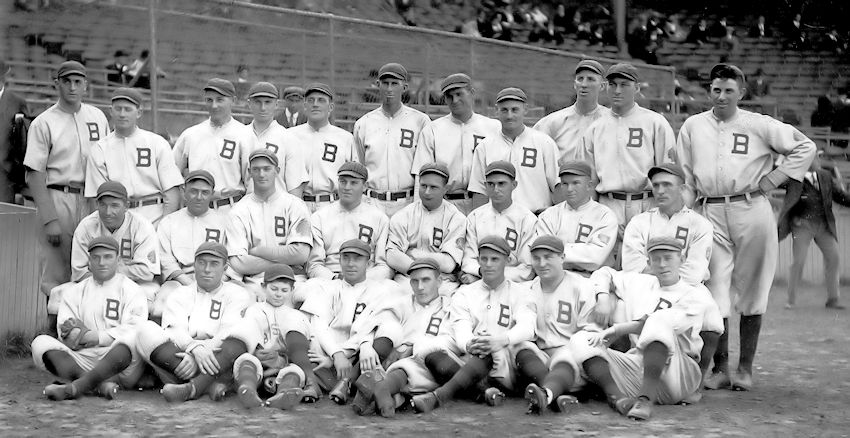
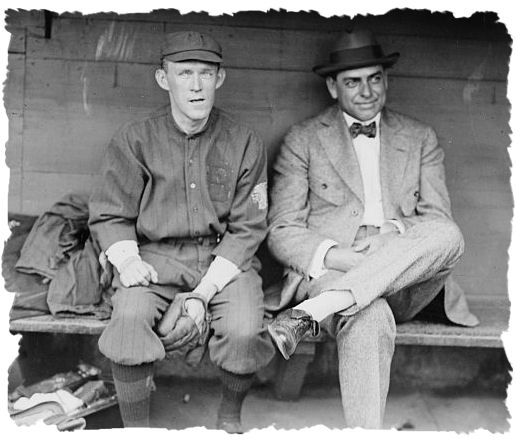
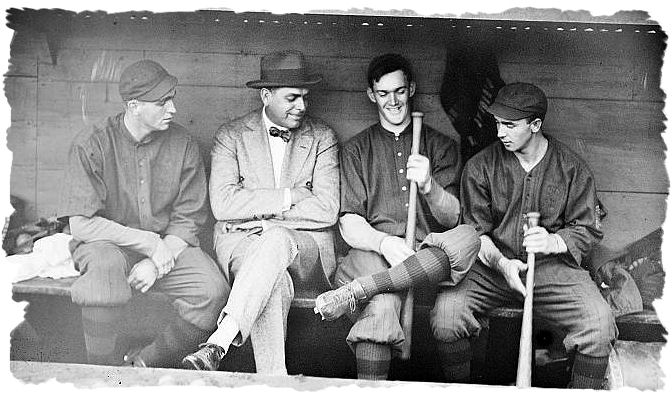



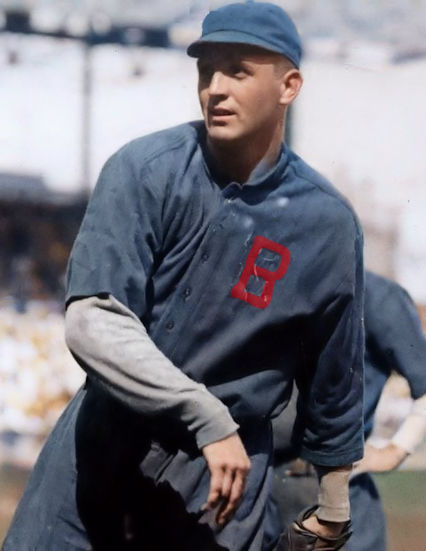


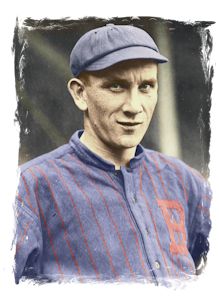

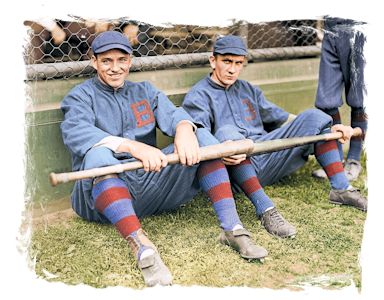
.jpg)
